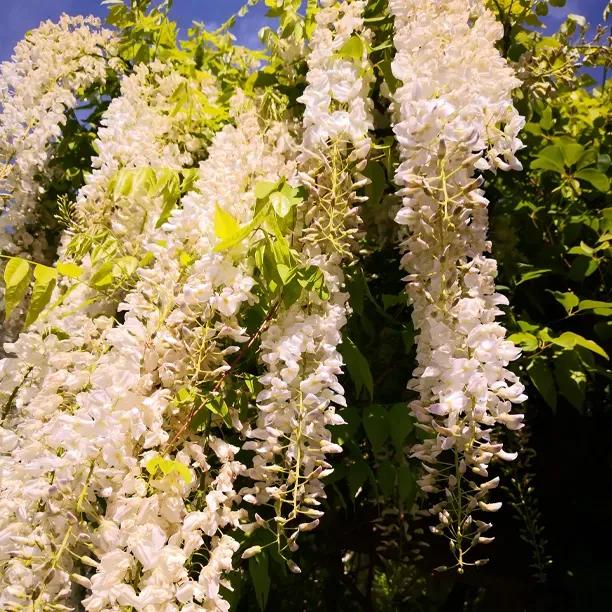White Chinese Wisteria Plants
Honest Delivery PricesWisteria sinensis
- White Chinese Wisteria
- Short strings of pure white flowers in May-June
- Will grow to 12m x 8m
- Lovely sweet perfume
- Fully hardy
Recommended extras
Description
Wisteria sinensis Alba
White Chinese Wisteria is a great, vigorous climber with strings of fragrant white flowers in May-June right before the bronze tinged new leaves unfurl. It needs a sturdy support to support its weight. It can also be trained as a specimen, on a frame in a large pot or planter. To 8-12m x 5-8m.
Browse our variety of wisteria or our full range of climbing plants.
Features:
- White Chinese Wisteria
- Large deciduous healthy climber
- Short strings of pure white flowers in May-June
- Will grow to 8-12m x 5-8m
- Lovely sweet perfume
- Anti-clockwise twining
- Fully hardy
- Needs support
Growing White Chinese Wisteria
It will need sturdy support and so a pergola, pillar or wall with vine eyes and wires, spaced at 12" distances, will work well. It will also grow over established trees as long as it is kept in check.
It is fully hardy, but strong winds will damage the leaves and flowers, so a sheltered site is best. It will need a fertile, moist but well-drained soil and prefers sun, but dappled shade is fine.
Did You Know?
This variety was introduced in 1846 by the Royal Horticultural Society, having been collected in China by the Scotsman Robert Fortune (1812-1880), the man credited with taking Chinese tea to India, where the locals enthusiastically mixed it with milk and spice to make chai, rather than drinking it pure or flavoured with flowers like jasmine after the Chinese style: this is one reason why Britain is unusual for drinking milky tea when almost all Europeans take it with a squeeze of lemon.
Planting Instructions
How to grow Wisteria sinensis Alba:
It will need a fertile, moist well-drained soil and a good root run. Plant in a hole substantially larger than the rootball and backfill with a multipurpose or suitable garden compost. Firm in well and water well. Mulch around the roots and feed with a general purpose fertiliser in spring and summer.
It will need the support of a pergola, pillar or vine eyes and wires when grown against a wall. The plant is vigorous with strong growth and so the support should be sufficiently sturdy.
It needs pruning twice a year. Two months after flowering the long shoots should be cut back to 5 or 6 buds from the stem and then, in mid-winter, it should be cut back again to 2 or 3 buds from the stem.
Look out for:
Generally disease free although it can be prone, on occasions, to leaf spot and powdery mildew. Watch for yellowing leaves and honeydew (sticky coating on leaves). If these are seen mealybugs may have infested the plant. Treat with a proprietary control.
All parts of the plant are poisonous and will cause severe stomach problems if ingested.


